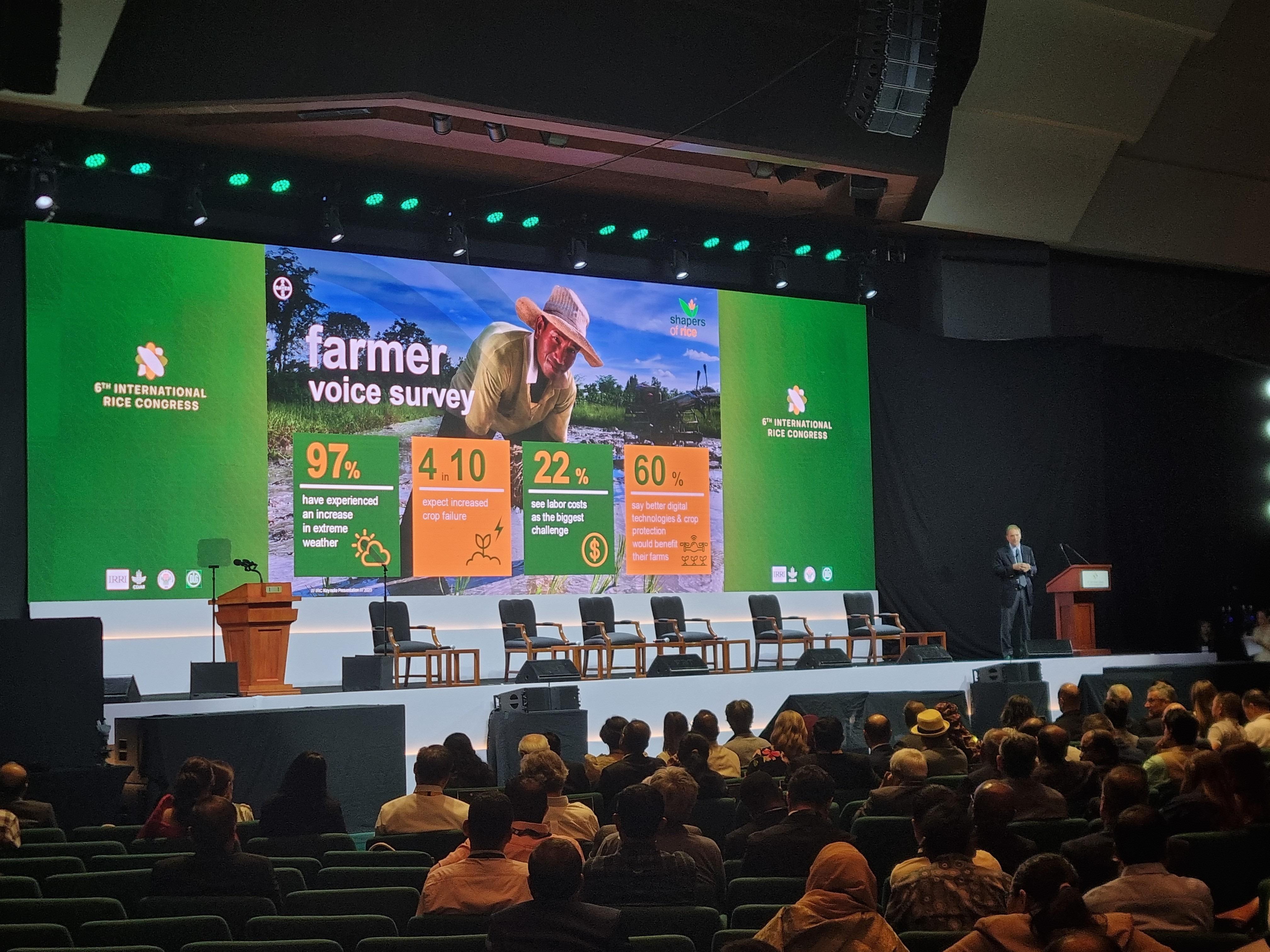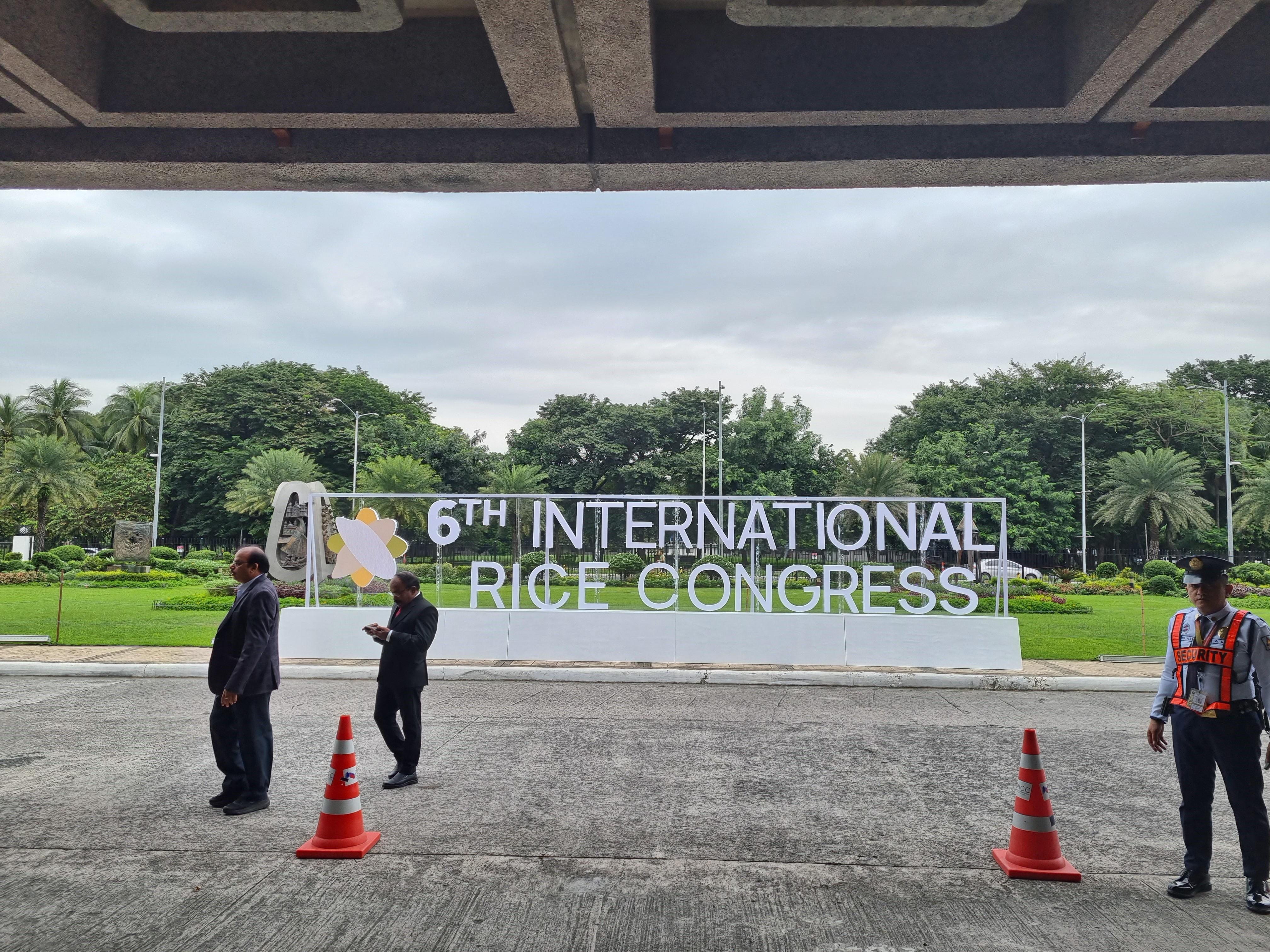 Scientists, experts, industry executives and government officials gathered at the opening of the 6th International Rice Congress in Manila, Oct 16, 2023. The International Rice Research Institute convenes the congress every four years. (EMMAN YABUT / FOR CHINA DAILY)
Scientists, experts, industry executives and government officials gathered at the opening of the 6th International Rice Congress in Manila, Oct 16, 2023. The International Rice Research Institute convenes the congress every four years. (EMMAN YABUT / FOR CHINA DAILY)
The International Rice Research Institute, or IRRI, has identified the genes responsible for low and ultra-low glycemic index (GI) in rice, a discovery that is expected to help in the global fight against diabetes.
IRRI, which is part of the Consortium of International Agricultural Research Centers (CGIAR), released its latest findings at the opening of the 6th International Rice Congress in Manila on Oct 16. The theme of this year’s event is "Accelerating Transformation of Rice-Based Food Systems: From Gene to Globe”.
Marcos said the Philippines will promote the development and use of more quality rice varieties and technologies such as the ultra-low GI Rice. He said that the research papers that will be presented during the four-day congress “will pave the way for greater strides” in the global rice industry
Philippines-based IRRI convenes the congress every four years, bringing together scientists, experts, industry executives and government officials to craft evidence-based solutions to some of the biggest challenges of the global rice sector.
The research center presented the first batch of ultra-low GI rice samples to Philippine President Ferdinand Marcos, Jr.
ALSO READ: 'Alarming' rise in diabetes expected globally by 2050, study says
In his plenary address, Marcos said the Philippines will promote the development and use of more quality rice varieties and technologies such as the ultra-low GI Rice. He said that the research papers that will be presented during the four-day congress “will pave the way for greater strides” in the global rice industry.
“I look forward to seeing innovations to be discussed in this congress come to life including the ultra-low GI in the near future,” he said.
Ajay Kohli, IRRI’s interim director-general, said IRRI's commitment to developing new rice varieties, enhancing the yields and ensuring the resilience of this essential crop has a direct impact on global food security.
“With over half of the world’s population depending on rice as a staple food, the implications of our research and collaborations are enormous,” he said.
ALSO READ: Growing appetite for cooperation
Rice is one of the most widely consumed food grains and is considered a staple by over 3.5 billion people worldwide. But dependence on rice can also lead to diabetes owing to its high GI that can spike blood sugar levels.
Many cultivated rice varieties have a GI ranging from 70 to 92, which is not considered healthy for people with diabetes, according to IRRI. The newly discovered ultra-low GI line has a GI level of 44.
According to the International Diabetes Federation, there were 537 million people with diabetes in 2021 and three in four adults with diabetes live in low- and middle-income countries. Nearly 7 million people died from complications caused by diabetes in 2021.
Marcos said that the rice congress is being held at “an opportune time”, allowing participants to compare and reevaluate policies. He mentioned the rising local rice prices, which stemmed from higher global rice prices and also due to typhoons that slashed local supply. Marcos said the situation was aggravated by smuggling and hoarding.
 The International Rice Research Institute convened the 6th International Rice Congress in Manila. This year’s theme is "Accelerating Transformation of Rice-Based Food Systems: From Gene to Globe", Oct 16, 2023. (EMMAN YABUT / FOR CHINA DAILY)
The International Rice Research Institute convened the 6th International Rice Congress in Manila. This year’s theme is "Accelerating Transformation of Rice-Based Food Systems: From Gene to Globe", Oct 16, 2023. (EMMAN YABUT / FOR CHINA DAILY)
“We will spare no effort to ensure the growth of rice (industry) here in our country … (while) safeguarding the welfare of farmers and consumers alike. We will do everything to pursue and punish those who are involved in smuggling and hoarding,” he said.
Cao Duc Phat, chairman of IRRI’s board of trustees, said this year’s congress is being held at “a critical time”.
“The rice sector is facing various challenges such as growing demand and competition for resources, while the adverse effects of climate change continue to degrade our ability to produce enough food,” he said.
READ MORE: ASEAN ministers move to cope with rising rice prices
Phat said developing a future without hunger is “a complex and multifaceted endeavor” and it requires the collective effort and commitment of governments, organizations, communities and individuals.
Bayer, one of the world’s biggest pharmaceutical and biotechnology firms, introduced its direct seeded rice system at the congress. The company said that the system has the potential to reduce carbon emissions and water usage by 40 percent.
Contact the writers at prime@chinadailyapac.com


